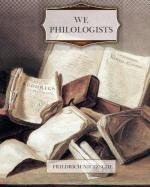179
Goethe grasped antiquity in the right way . invariably with an emulative soul. But who else did so? One sees nothing of a well-thought-out pedagogics of this nature: who knows that there is a certain knowledge of antiquity which cannot be imparted to youths!
The puerile character of philology: devised by teachers for pupils.
180
The ever more and more common form of the ideal: first men, then institutions, finally tendencies, purposes, or the want of them. The highest form: the conquest of the ideal by a backward movement from tendencies to institutions, and from institutions to men.
181
I will set down in writing what I no longer believe—and also what I do believe. Man stands in the midst of the great whirlpool of forces, and imagines that this whirlpool is rational and has a rational aim in view: error! The only rationality that we know is the small reason of man: he must exert it to the utmost, and it invariably leaves him in the lurch if he tries to place himself in the hands of “Providence.”
Our only happiness lies in reason; all the remainder of the world is dreary. The highest reason, however, is seen by me in the work of the artist, and he can feel it to be such: there may be something which, when it can be consciously brought forward, may afford an even greater feeling of reason and happiness: for example, the course of the solar system, the breeding and education of a man.
Happiness lies in rapidity of feeling and thinking: everything else is slow, gradual, and stupid. The man who could feel the progress of a ray of light would be greatly enraptured, for it is very rapid.
Thinking of one’s self affords little happiness. But when we do experience happiness therein the reason is that we are not thinking of ourselves, but of our ideal. This lies far off; and only the rapid man attains it and rejoices.
An amalgamation of a great centre of men for the breeding of better men is the task of the future. The individual must become familiarised with claims that, when he says Yea to his own will, he also says Yea to the will of that centre—for example, in reference to a choice, as among women for marriage, and likewise as to the manner in which his child shall be brought up. Until now no single individuality, or only the very rarest, have been free: they were influenced by these conceptions, but likewise by the bad and contradictory organisation of the individual purposes.
182
Education is in the first place instruction in what is necessary, and then in what is changing and inconstant. The youth is introduced to nature, and the sway of laws is everywhere pointed out to him; followed by an explanation of the laws of ordinary society. Even at this early stage the question will arise: was it absolutely necessary that this should have been so? He gradually comes to need history to ascertain how these things have been brought about. He learns at the same time, however, that they may be changed into something else. What is the extent of man’s power over things? This is the question in connection with all education. To show how things may become other than what they are we may, for example, point to the Greeks. We need the Romans to show how things became what they were.




